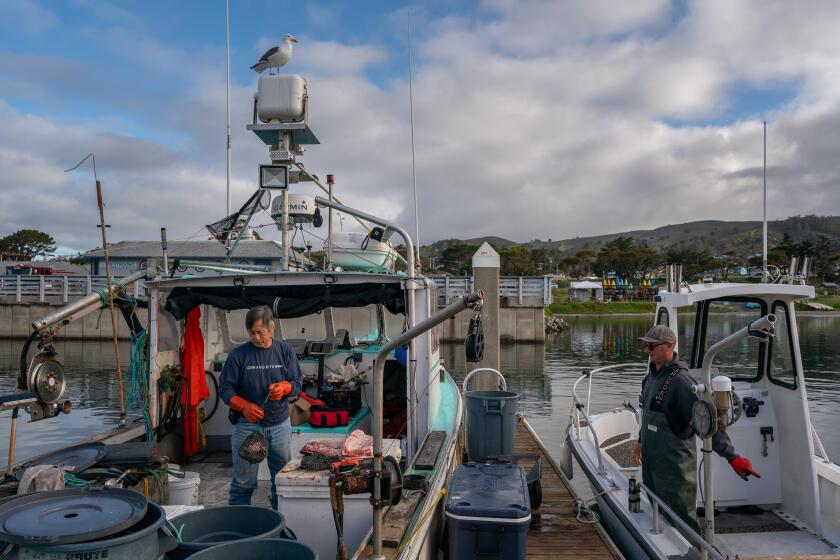Tainted spinach tied to cattle ranch
Contaminated spinach that sickened hundreds of people and prompted an unprecedented nationwide recall last fall came from a cattle ranch east of Salinas, according to a report by state and federal investigators released Friday.
The spinach was grown on a 50-acre field owned by Paicines Ranch, which raises about 2,000 head of grass-fed cattle in the San Benito County town of Paicines, according to the report by the California Department of Health Services and the U.S. Food and Drug Administration’s San Francisco District.
The ranch leases a small amount of cropland to Salinas-based Mission Organics.
Twenty-six samples of feces, soil and surface water at the ranch matched the genetic strain of bacteria in bags of spinach that made people sick.
A Natural Selection Foods packaging plant in San Juan Bautista was the only processor involved, the report says.
Although the long-awaited findings of the joint federal and state investigation point to one California-grown crop and one processing plant, health officials stressed that pathogens in vegetables and fruits are a serious nationwide health problem. Outbreaks of potentially lethal illnesses linked to produce -- particularly leafy greens -- have been growing more frequent and larger in scope in recent years.
Three people, including a toddler, died in the spinach outbreak of last August and September, when 205 illnesses were reported in 26 states. The Centers for Disease Control and Prevention estimated that about 4,000 people were sickened by the spinach, taking into account that relatively few cases are typically reported.
The contamination probably occurred in the Mission Organics crop before harvest, but it might have spread further during bagging and processing at the Natural Selection plant, according to the investigators.
“No obvious sources for introduction of the pathogen were identified at the processing facility. However, a number of conditions were observed that may have provided opportunities for the spread of pathogens, if pathogens arrived on incoming spinach,” the report says.
The same type of pathogen that caused the outbreak, E. coli O157:H7, was discovered in feces, river water and soil at three other spinach farms nearby, suggesting that the bacterium, which originates in cattle, is widespread in the greater Salinas Valley, where much of the nation’s produce is grown.
However, the bacteria at those three farms did not genetically match the outbreak strain.
Water or wild pigs are the most likely sources of contamination at the Paicines Ranch, according to the report. E. coli O157:H7 was discovered in river water as well as feces from cattle and feral pigs on the ranch.
The San Benito River, which flows through the ranch and picks up E. coli from cattle manure, could have tainted the ranch’s well water. The river water might have percolated into the groundwater tapped by the wells, the report says.
Also, the ranch has a large population of feral pigs that could have spread feces to the spinach. Fences on the ranch had holes and looked as though pigs had dug under them.
Brad Sullivan, an attorney for Mission Organics, said the report did not conclusively link the company with the E. coli, emphasizing that it was not found in the spinach field but on ranchland a mile away.
Sullivan stopped short of saying Mission Organics feels responsible for the outbreak, but said the company does feel “very concerned.”
Sullivan said Mission Organics will not use its leased land in Paicines to grow more crops until the company and officials address the most likely sources of bacteria -- wildlife and water.
Bob Perkins, executive director of the Monterey County Farm Bureau, said “it appears none of the regulatory agencies nor the farmers can say, ‘Aha, this is the cause, and if we fix this, this won’t happen again.’ ”
Natural Selection Foods said in a statement that the investigation was “careful and thorough” even though most people hoped for “a more decisive conclusion” about the cause. The company said it would like to see national standards for produce.
“What is certain is that E. coli O157:H7 and other pathogens are present in the environment, and research and regulation are urgently needed,” the company said.
Natural Selection said it has begun a more extensive testing program at its plants and in fields. “We believe our salads are safer than ever before,” the company said.
The packaging plant did not have a valid state permit at the time of the outbreak because Natural Selection was leasing it and preparing to buy it from Pride of San Juan and had not yet obtained a permit under its name, the report says. No fines have been assessed.
State officials are working with Mission Organics and Natural Selection to ensure safe agricultural practices are followed.
“What relative roles each of these played, we don’t know for sure,” said Dr. Kevin Reilly, deputy director of prevention services at the state health department.
The spinach in the outbreak, sold under a Dole label, was grown in an organic way but was not labeled or certified organic.
Federal and state officials said their six-month investigation was the first time a pathogen was tracked from fork to field.
Dr. David Acheson, chief medical officer of the FDA’s Center for Food Safety and Applied Nutrition, said it’s critical for every farm and processor to follow national guidelines to minimize bacteria on produce.
“A relatively small plot can potentially be the source of a nationwide outbreak,” he said, adding that more research is needed to “find out how these bugs get onto produce in the first place.”
The FDA has asked produce growers and processors since 1998 to follow a long list of steps to minimize the danger of pathogens on fresh fruits and vegetables, including recommendations for water testing, worker hygiene, handling of manure and control of wild animals. Then, in 2004 and 2005, the FDA sent letters to growers of leafy greens expressing concern about outbreaks and again advising them to follow the guidelines. The guidelines, known as Good Agricultural Practices, are voluntary and no field inspections are conducted.
State Sen. Dean Florez (D-Shafter), who has introduced bills that would make the agricultural practices mandatory for growers of leafy greens, said the report “sounds like a broken record” and “is devoid of any action plan.” He called it “shameful” that state regulators “have relegated themselves to the position of simple spectators to the most deadly E. coli outbreak emanating from California.”
In the last decade, 72 bacterial and viral outbreaks have been caused by contamination of fruits and vegetables, led by leafy greens with 22 outbreaks, followed by tomatoes and melons.
The FDA is debating a new national strategy for produce that could remain voluntary or include some mandatory rules.
In the meantime, the California produce industry on April 1 plans to initiate a voluntary agreement that has been signed by handlers who account for 90% of the state’s spinach. Those who sign the agreement must buy crops only from farmers who follow guidelines being developed by an industry board.
“The ultimate goal is to move this to a mandatory program for all growers and all suppliers,” said Hank Giclas of the Western Growers Assn., which developed the agreement.
Consumer activist groups are pushing for mandatory federal rules.
Voluntary programs “utterly failed,” said Elisa Odabashian of the Consumers Union, a national activist group. “Consumers are really sitting ducks. They need government intervention.”
Schwarzenegger administration officials say the industry-led, voluntary approach is the quickest solution.
The new agreement “will reduce risk substantially,” said Dr. Jeff Farrar, chief of the state health department’s food and drug branch, although he warned that “we will not achieve zero risk in the near future for this commodity.”
marla.cone@latimes.com
Lin reported from Paicines, Cone from Los Angeles.
More to Read
Start your day right
Sign up for Essential California for news, features and recommendations from the L.A. Times and beyond in your inbox six days a week.
You may occasionally receive promotional content from the Los Angeles Times.







